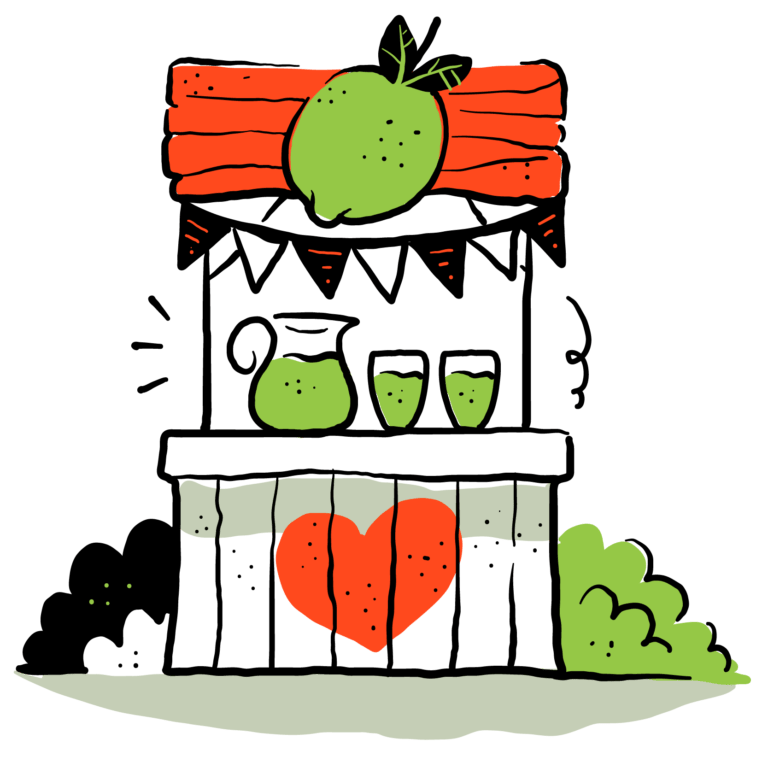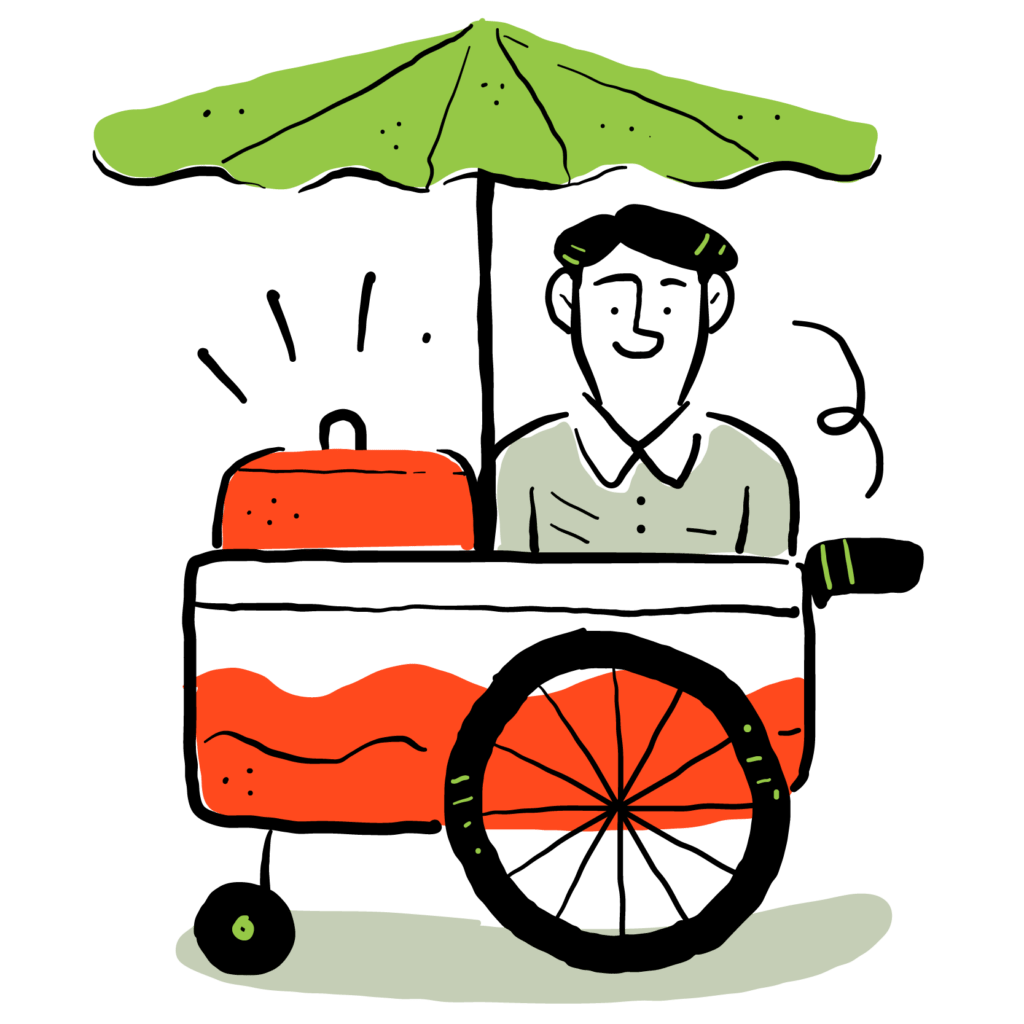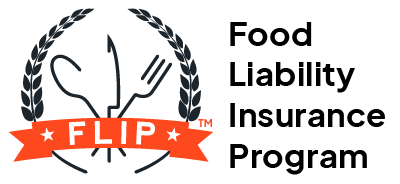Food Vendor Insurance
America's top choice for affordable, personalized, and highly rated food vendor liability insurance.
Benefits of Insurance for Food Vendors
Check out what FLIP’s vendor insurance has to offer your business.

Affordable, A+ Rated Coverage
Protect your business without going over budget. Our policies are highly rated and priced right, so you don’t sacrifice quality for cost.

Instant Quote Process
It only takes 10 minutes or less to purchase your policy online, so you can get back to running your business ASAP.

Personalize Your Policy
Insurance isn’t one-size-fits-all. Customize your coverage with add-ons to create the perfect policy for your business.
What Is Liability Insurance for Food Vendors?
Food vendors’ insurance is a combination of coverages protecting your business from these common claims:
Claims can cost you thousands of dollars — or more. Insurance for food vendors is designed to cover some or even all of the cost, saving you the financial burden of paying out of pocket.
What Does Food Vendor Insurance Cover?
Liability insurance for food vendors can cover costs you’re held liable for when you or someone else files a claim against your policy, including:
- Repairs or replacements for destroyed or damaged property
- Medical bills
- Settlements
- Attorney’s fees
What Type of Insurance Do Food Vendors Need?
Every food vendor needs these coverages:
These are all included in your base food vendor insurance policy from FLIP to help protect you from the most common risks you face.
But not all businesses are the same, and yours may need additional coverage like:
- Food trailer endorsement (offered exclusively by FLIP)
How Much Does Food Vendor Insurance Cost?
The cost of food vendor insurance starts at $25.92 per month or $299 per year. The price can be affected by a few factors, including:
- What state(s) your business operates in
- Your gross annual revenue
- Any add-on coverages you include (e.g., tools and equipment or the food trailer endorsement)
- The coverage limits you need
Cost is crucial when selecting the right coverage for your business, but the cheapest vendor insurance may not offer the best protection.
With FLIP, you get the food vendor coverage you need at an affordable price, with options to customize your policy and keep your business safe without breaking the bank.
What Types of Food Vendors Need Insurance?
All food vendors need insurance regardless of what or where they sell. You can be held liable for any injuries, illnesses, or damages your business causes.
Also, many farmers markets, state fairs, and festivals require you to be insured and will ask you to add them to your policy as an additional insured before you can participate.
Businesses that need vendor insurance include, but are not limited to:
How Do I Get Food Vendor Liability Insurance?
With FLIP, you can get food vendors’ insurance in 10 minutes or less with our easy online application!
- Start your application
- Select your business activities
- Fill out the required information
- Get your free quote and finish checking out
FLIP: The Best Food Vendor Insurance Provider
Food Vendor Insurance Coverage Details
General Liability
Aggregate Limit: $2,000,000
General liability insurance is designed to cover the cost of third-party bodily injury and property damage claims, including medical fees, attorney fees, and property repairs/replacements.
Product Liability
Aggregate Limit: $2,000,000
This coverage shields you from the financial impact of claims related to your food or beverage products. If a customer gets food poisoning from an undercooked burger or has an allergic reaction to an almond milk latte, product liability can cover the cost of their medical bills and your legal expenses.
Products-Completed Operations
Aggregate Limit: $2,000,000
Products-completed operations involves two coverages in one, covering claims related to your products and services. Food poisoning claims can be covered by this insurance, as well as claims stemming from your failure to fulfill your contract with a venue.
Personal and Advertising Injury
Aggregate Limit: $1,000,000
If you accidentally advertise your products as organic, but it turns out they aren’t, and someone sues you for it, personal and advertising injury could cover your legal expenses. This coverage also responds to personal injury claims like libel, slander, and defamation.
Damage to Premises Rented
Aggregate Limit: $300,000
For the first seven days you rent a space, like a commercial kitchen, this coverage can respond to any claims involving damages you cause to that property. After the first seven days, it only covers fire damage.
Hear From Our Insured Food Vendors
Here's what other business owners say about their experience from over 300+ available reviews.
Coverage Details Limits
General Liability Aggregate Limit
$2,000,000
Products – Completed Operations Aggregate Limit
$2,000,000
Personal and Advertising Injury Limit
$1,000,000
General Each Occurrence Limit
$1,000,000
Damage to Premises Rented to You Limit (Any One Premises)
$300,000
Liability Deductible
NO DEDUCTIBLE
Inland Marine Limit (Any One Article / Aggregate)
$5,000 / $10,000
Inland Marine Limit (Per Occurrence) – Deductible
$250
Medical Expense Limit
$5,000

Learn More About Food Vendor Insurance
Get more details about FLIP’s food vendor insurance and discover what it can do for your business.
FAQs About Insurance for Food Vendors
Is Food Vendor Insurance Required by Law?
Depending on where you live, you may be legally required to carry general liability insurance for your business. Even if food vendor insurance isn’t required by your local laws, you will be asked by event and festival organizers to provide proof of insurance.
By carrying vendor insurance, you open your business up to more opportunities than you’d have without insurance, making it easier to grow your business!
Does Food Vendor Insurance Cover Me at Events and Festivals?
Yes! Your policy follows you throughout the USA and Canada and can protect you from third-party injury or property damage claims at events, fairs, festivals, and more.
Can I List an Event as an Additional Insured on My Food Vendor Insurance Policy?
Yes! We offer free and unlimited additional insureds that you can add at any time through your user dashboard.
Can I Get a One-Day Food Vendor Insurance Policy?
FLIP doesn’t offer one-day general liability policies for food vendor insurance at this time. However, if you vend more than once a year, our annual policy takes the stress out of rushing to get insurance every time you want to work an event.
You can also stagger the cost of an annual policy with monthly payments, allowing you to pay incrementally for your coverage throughout the year versus all at once.
